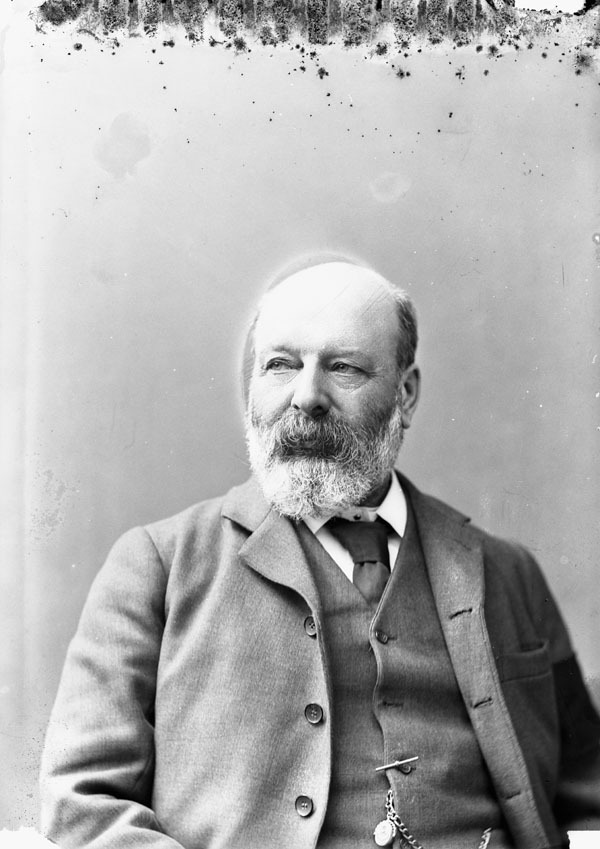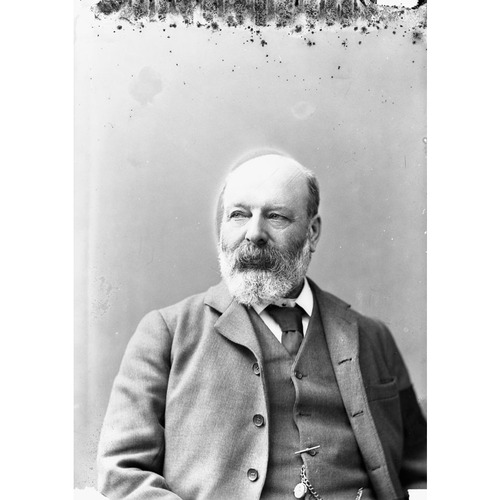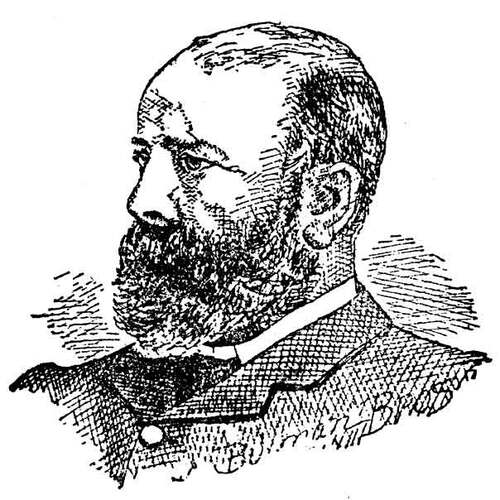SCARTH, WILLIAM BAIN, businessman, politician, and office holder; b. 10 Nov. 1837 in Aberdeen, Scotland, second son of James Scarth, a merchant, and Lane Geddes; m. 27 April 1869 Jessie Stuart Franklin Hamilton, sister of the wife of Alexander Begg*, in Hamilton, Ont., and they had at least eight children, including four sons and three daughters; d. 15 May 1902 in Ottawa.
Educated in Edinburgh and Aberdeen, William Bain Scarth, a descendant of the Binscarths of the Orkney Islands, immigrated to Upper Canada in 1855. He immediately acquired a taste for Conservative politics and campaigned for Isaac Buchanan* in Hamilton. A young man of promise, Scarth set off for London to work for Buchanan’s associate, Adam Hope*. In 1865 he followed Hope to Hamilton and in 1868 he moved to Toronto to work for him. By 1870 he was manager of A. and C. J. Hope and Company, the Toronto arm of Hope’s hardware business, but he may also have been attempting to branch out on his own as a commission merchant. Hope’s Toronto firm closed the following year. Despite this set-back Scarth had acquired valuable experience. His political activity in London and Hamilton had won him respect and his emerging friendship with Sir John A. Macdonald* decisively guided his future.
Scarth had married in 1869 and had settled in prosperous St James Ward. He served as one of the ward’s aldermen in 1879 and 1882, president of its Conservative association, and chairman of the federal Conservative party’s forces in the riding of Toronto Centre. His ruling passion was the welfare of the federal Conservative party and he claimed to have figured prominently in every electoral campaign waged in Toronto between 1875 and 1884. None the less, his bid in 1883 to repeat his modest electoral success failed.
Scarth had set himself up in 1871 as a shipowner and timber merchant. By 1873, with his brother James Lendrum Scarth, he had formed Scarth Brothers, a firm of timber merchants. The following year they joined Alexander McArthur*, his brothers John and Peter, and other businessmen to form the Collins Bay Rafting and Forwarding Company. The firm was probably involved in the extensive lumbering operations of McArthur Brothers on Georgian Bay. Scarth’s connection with it continued into the 1880s, but Scarth Brothers may have dissolved around 1875. In that year Scarth, his brother, and Robert Cochran formed Scarth, Cochran and Company, stockbrokers and real-estate agents. Apart from his own involvements in insurance, railways, mining and real estate, Scarth made his mark as an enterprising manager of British capital in Canada. He was instrumental in the establishment of the North British Canadian Investment Company and the Scottish Ontario and Manitoba Land Company, founded in 1876 and 1879 respectively, with boards of directors composed of similar groups of merchant capitalists from Glasgow. The two firms were involved in land speculation and property development. On his advice, they invested heavily in Toronto and the northwest, and in 1880 Scarth established agencies for both in Manitoba. The boom in Manitoba [see Alexander Logan*] was just in the offing, but he confided to Macdonald in 1880 that he had borne “for five years back . . . continuous worry and trial” over his personal financial situation. He would experience financial difficulties at various times throughout his life.
On 6 June 1882 the Canadian Pacific Railway sold a large portion of its land grant to a consortium of English and Canadian capitalists represented by Scarth, Edmund Boyd Osler*, and others. The land was in turn sold to the Canada North-West Land Company, created two weeks later, and Scarth was catapulted into the position of managing director of the company. Through its successive boards of directors, Scarth would associate with members of the British peerage, some of the directors of the Scottish land companies, and notables such as explorer John Rae* (his wife’s uncle) and Donald Alexander Smith*. In 1884, a year after an agreement had been struck between the CPR, the CNWLC, and the dominion government for the development of the townsites of Virden, Man., and Regina, Qu’Appelle, and Moose Jaw (Sask.), Scarth assumed sole administrative responsibility for the joint venture.
As the excitement of the early 1880s died, Scarth’s three land companies floundered with unrealized investments. Writing to Macdonald from Winnipeg in 1884, he explained that he had moved there with his family to “work my [Scottish] friends well out of the company, or rather the company itself well out if I can.” He had no small task ahead of him. Declining sales forced the CNWLC to reduce the number of its directors and the size of its operations. Power in the company slowly passed into the hands of Canadians and Scarth found the climate inhospitable after the departure of directors who were his friends. His own finances suffered and moved him at times to desperation. His appeals to Macdonald for favours grew progressively less fastidious. “Like many others,” he wrote, “I made losses in the boom and in addition to being cleaned out of money am daily meeting obligations from my income.”
His financial situation did little, however, to damp his political enthusiasm. In 1885 he was elected president of the Liberal-Conservative Association in Winnipeg, in spite of complaints from Liberal shareholders in the CNWLC. Although Scarth had a well-deserved reputation for honesty and integrity, his critics deplored his lack of judgement. He often leaned on Macdonald for instruction in situations where subtlety and discretion were required. Notwithstanding his zeal, his attempts to cement together the supporters of Macdonald and those of provincial Conservative leader John Norquay* proved ineffective. Although widely known as a leading representative of Macdonald, Scarth could not command unquestioned support for his leader’s wishes even among those who considered themselves Macdonald’s men.
Having obtained Macdonald’s blessing and the grudging consent of the CNWLC, Scarth ran as an independent against William Fisher Luxton in the provincial election of December 1886. Unfortunately he had no organization to speak of two weeks before the vote and was bedridden with bronchitis for much of the campaign. Macdonald’s followers failed to back him, and the Norquayites who supported him did him great injury by denouncing Macdonald’s policy of disallowing provincial railway legislation. Unsuccessful in straddling both wings of the party, Scarth lost by 39 votes.
Long before the election, Scarth had been intimately involved in organizing the campaign for the impending federal election on behalf of Donald Alexander Smith. When Smith withdrew from the race in the riding of Winnipeg the Conservatives were left without a strong candidate there. Macdonald thrice pressed the party’s standard on Scarth, who eventually accepted. Heaven and earth were then moved to win Scarth the seat. Macdonald lured Duncan MacArthur out of contention with the promise of an appointment to the Senate and provided Scarth with the means to attack the other contestant, Hugh McKay Sutherland*, promoter of the Winnipeg and Hudson Bay Railway. Scarth won by eight votes on 22 Feb. 1887.
His activity in the Anti-Disallowance Association, formed shortly after the elections, was simply a ruse; as the provincial and federal governments moved towards confrontation, he was compelled to maintain the appearance of opposing Ottawa’s unpopular policy. His situation was unenviable. When the Norquay regime entered its final crisis, he was drawn into negotiations to establish a coalition government under David Howard Harrison, based on a proposal to end the CPR monopoly in 1891 in return for the cessation of hostile provincial railway legislation. Scarth’s indiscriminant use of the prime minister’s letters revealed Macdonald to be the real architect of the plan and he faced an open revolt by anti-disallowance Conservatives who wrenched the leadership of the Winnipeg Liberal-Conservative Association from his hands. His identification with Macdonald without open recognition of his services from his mentor had left him severely vulnerable. His political career lay in tatters.
The CNWLC applied enormous pressure in April 1888 to have Scarth abandon political office, since his activity was a dubious asset to the company. Macdonald, alarmed at the prospect of reopening the riding, asked Sir George Stephen*, who was president of the CPR and had great influence with the CNWLC, to allow Scarth to retain his seat for the sake of the northwest and the railway. Stephen’s reply was blunt. Scarth was too “ready to sacrifice himself and his family . . . for an ambition that in his case is hollow, he is not and never can be anything politically but a ciffer.” Macdonald apparently ceased to consult Scarth on important political matters, patiently withstanding his periodic outbursts of frustration at the prime minister and the “CPR magnates” who impaired his usefulness.
Just before the election of 1891 the CNWLC attempted, without Scarth’s knowledge, to bargain for his retirement from politics in return for tax concessions from the administration of Premier Thomas Greenway, but the plan failed. Humiliated, Scarth considered exposing the deal, but his sizeable family and his financial straits led him to decide otherwise. Faced with opposition from the CNWLC to his participation in the campaign, he favoured the nomination of Macdonald’s son, Hugh John*, and finally prevailed on the prime minister to agree to it.
A leading contender for the position of lieutenant governor to replace John Christian Schultz*, Scarth enhanced his qualifications in 1894 by becoming president of the Winnipeg Industrial Exhibition Association and the Winnipeg Board of Trade. He had a serious rival in Arthur Wellington Ross, the champion of the party’s rank and file; Scarth’s support came from the party’s élite. Because of deep divisions in Conservative ranks concerning the appointment, eventually both he and Ross were passed over, notwithstanding some furious angling on their part. Scarth’s final reward came with his appointment as deputy minister of agriculture in Ottawa on 1 Dec. 1895.
Whatever expertise Scarth may have had in agricultural policy was never utilized. During his tenure he was preoccupied with matters of quarantine, and in 1897 he was given additional responsibilities as deputy commissioner of patents. His health began to deteriorate in 1898. He was stricken with diplopia a year later. Shortly afterwards, the Liberal government of Sir Wilfrid Laurier* launched an investigation into the accounts of the town-site trust established in 1884 (Scarth had been re-elected to its board of directors in 1895). A commission questioned him at length. Its report criticized Scarth’s involvement in securing refunds for his Scottish friends in 1886. In obtaining the refunds Scarth had requested of Macdonald that the credit for settling the question with the government be given to him rather than to Sir Alexander Tilloch Galt*, whom the Scottish investors had hired to represent them. Macdonald had pronounced Scarth “worth a dozen Galts.” It was an affirmation that would scarcely survive the prime minister. With Macdonald’s death in 1891 Scarth’s heyday had passed. He stayed in office until his death in 1902, although illness prevented him from discharging his duties during his final years.
AO, F 67. Man., Dept. of Consumer and Corporate Affairs, Corporations Branch (Winnipeg), Canada North-West Land Company files; North British Canadian Investment Company files; Scottish Ontario and Manitoba Land Company files. NA, MG 24, H35; MG 26, A, 21, 113, 186, 214, 260–65, 326, 525, 528–30 (mfm. at PAM); D, 182, 186–87, 202, 215 (mfm. at PAM); MG 27, II, D15; RG 17, A I, 1713–35; RG 31, C1, 1891, Winnipeg, Ward 2: 113. PAM, GR 553; MG 12, E. Hamilton Spectator, 28 April 1869. Manitoba Morning Free Press, 1887–1901. Manitoba Sun (Winnipeg), 8 Dec. 1886, 15 Jan. 1887. Winnipeg Tribune, March–April 1895. J. W. Brennan, “Business-government co-operation in townsite promotion in Regina and Moose Jaw, 1882–1903,” Town and city: aspects of western Canadian urban development, ed. A. F. J. Artibise (Regina, 1981), 95–120. Can., Statutes, 1874, c.108. Directories, Ont., 1871; Toronto, 1869–85. H. A. Fleming, Canada’s Arctic outlet: a history of the Hudson Bay Railway (Berkeley, Calif., 1957; repr. Westport, Conn., 1978). Douglas McCalla, The Upper Canada trade, 1834–1872: a study of the Buchanans’ business (Toronto, 1979). [I. M. Marjoribanks Hamilton-Gordon, Marchioness of] Aberdeen [and Temair], The Canadian journal of Lady Aberdeen, 1893–1898, ed. and intro. J. T. Saywell (Toronto, 1960). “Western men: no.7 – Mr. William Bain Scarth,” Western World (Winnipeg), no.62: 1–2.
Bibliography for the revised version:
Ancestry.com, “Ontario, Canada, deaths and deaths overseas, 1869–1949”: www.ancestry.ca/search/collections/8946 (consulted 25 June 2020). Find a Grave, “Memorial no.132413356”: www.findagrave.com (consulted 14 July 2o20). National Records of Scot. (Edinburgh), OPR births & baptisms, Dornoch (Sutherland), 20 Dec. 1833; Old Machar (Aberdeen), 10 Nov. 1837.
Cite This Article
Zenon Gawron, “SCARTH, WILLIAM BAIN,” in Dictionary of Canadian Biography, vol. 13, University of Toronto/Université Laval, 2003–, accessed November 26, 2024, https://www.biographi.ca/en/bio/scarth_william_bain_13E.html.
The citation above shows the format for footnotes and endnotes according to the Chicago manual of style (16th edition). Information to be used in other citation formats:
| Permalink: | https://www.biographi.ca/en/bio/scarth_william_bain_13E.html |
| Author of Article: | Zenon Gawron |
| Title of Article: | SCARTH, WILLIAM BAIN |
| Publication Name: | Dictionary of Canadian Biography, vol. 13 |
| Publisher: | University of Toronto/Université Laval |
| Year of publication: | 1994 |
| Year of revision: | 2024 |
| Access Date: | November 26, 2024 |





